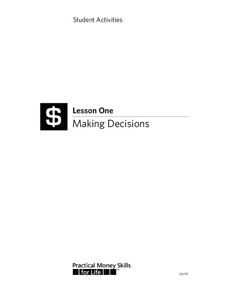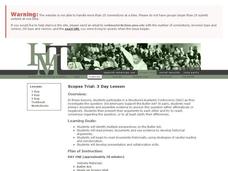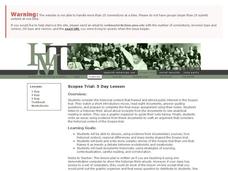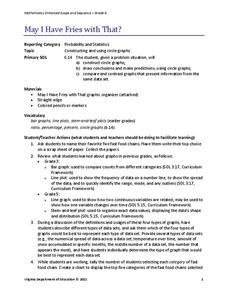Visa
Making Decisions
What economic factors can influence personal and financial decisions? In an effort to understand opportunity costs and the time value of money, pupils engage in role-playing activities and discussion, as well as view a PowerPoint...
Science 4 Inquiry
Journey Through the Spheres of the Earth
Each of the Earth's spheres interacts with the other spheres in predictable ways. Young scientists explore these interactions through a hands-on activity, graphing, and watching a video. They summarize their knowledge in a video or...
Historical Thinking Matters
Rosa Parks: 5 Day Lesson
What led to the success of the Montgomery Bus Boycott, and how might historians approach this question differently? This rich series of lessons includes a short introductory video clip, analysis of six primary source documents, and...
Ontario
Reading Informational Text
Learning to recognize the importance of the features of information text (i.e., titles, subtitles, endnotes, sidebars, etc.) is the focus of a reading activity designed for middle schoolers. Learners examine how these text features help...
Historical Thinking Matters
Scopes Trial: 3 Day Lesson
Was the Scopes trial more complicated than a simple debate between evolutionists and creationists? As part of a structured academic controversy (SAC) activity, pupils consider multiple perspectives of the Butler Act and engage in close...
Maryland Department of Education
The Concept of Diversity in World Literature Lesson 9: Debating Imperialism
To gain an understanding of Imperialism, class members read Rudyard Kipling's poem, "The White Man's Burden" and Mark Twain's essay, "To the Person Sitting in Darkness." Groups compare these perceptions of non-white cultures with the...
Curated OER
Parts of a Friendly Letter
The art of writing a letter has not been lost to email and texting! Teach kids how to format a friendly letter with a presentation about the parts of a letter, as well as prompting them to write a letter about their favorite holiday.
Science 4 Inquiry
The Ins and Outs of Photosynthesis
The most important chemical process on Earth is photosynthesis. Scholars explore the changes in the gases in our atmosphere as life on Earth developed. They create a model of photosynthesis and consider simple questions.
iCivics
The “Supreme” in Supreme Court
Does a public school have the right to restrict what t-shirts students wear? Discover what happened when this question was brought to the Supreme Court, and review other major cases in United States history involving judicial review....
PBS
Crack the Case: History's Toughest Mysteries
Young sleuths don their trench coats, tip their fedoras, and grab their notepads to investigate one of four famous unsolved mysteries. After examining multiple primary and secondary sources related to their cold case, they propose a...
Historical Thinking Matters
Spanish-American War: 1 Day Lesson
After analyzing newspaper articles portraying different perspectives of the explosion of the Battleship USS Maine, your young historians will take a stand on which position is the most believable in both discussion and writing.
Incredible Art
Faberge Eggs: Ceramic Pinch Pots
Introduce your potters to pinching, the ceramic hand-building technique, by asking them to craft their own Faberge egg. An 18-slide presentation, included in the resource, demonstrates the pinch pot technique and includes photos of...
Houghton Mifflin Harcourt
Voyagers: Challenge Activities (Theme 5)
Young voyagers face the challenge of the wide dark sea, travel with Yunmi and Halmoni, and even get trapped by the ice as they explore the reading selections offered in these enrichment activities designed for the Houghton Mifflin...
Historical Thinking Matters
Scopes Trial: 1 Day Lesson
Why did many Tennesseeans support the 1925 Butler Act, which forbade the teaching of evolution? Using several primary source documents and a brief video clip, your young historians will draw connections between the broader historical...
Historical Thinking Matters
Scopes Trial: 5 Day Lesson
Did Scopes violate the Butler Act? Why did so many Americans follow the Scopes trial? See analytical reading in action with a fantastic five-day lesson plan in which class members consider the historical context that provoked public...
iCivics
The Fourth Branch: You!
Take time to remind your young learners of the valuable understanding that each branch of the United States government is really composed of other citizens. The reading material and worksheets of this resource cover the importance of...
Curated OER
A High-Interest Novel Helps Struggling Readers Confront Bullying in Schools
Bully, bullied, or bystander? Paul Langan's The Bully is the anchor text in a unit that examines bullying and violence. After a close reading of the text, readers imagine themselves as the characters and consider how they would react in...
Science 4 Inquiry
Introducing the Types of Energy
Young scientists explore many different types of energy including light, heat, nuclear, sound, potential, and more. They match the types of energy and identify when energy transfers from one type to another.
Curated OER
Nonfiction Genre Mini-Unit: Persuasive Writing
Should primary graders have their own computers? Should animals be kept in captivity? Young writers learn how to develop and support a claim in this short unit on persuasive writing.
Jamestown-Yorktown Foundation
Why Did Some Colonial Virginians Continue to Support the King?
Not all colonials supported the American Revolution. A resource from the American Revolution Museum at Yorktown ask young historians to investigate the reasons why some colonial Virginians were loyalist and continued to support King...
Stanford University
Pullman Strike
History is ironic, isn't it? In the Pullman strike, federal power thought to protect citizens was used to break the union. What started as a quest for better wages and benefits during an economic crisis was crushed through violence and...
CPALMS
Point of View: A Close Reading of Two Bad Ants
Chris Van Allsburg's Two Bad Ants provides third graders with an opportunity to examine point of view and how the point of view of others may differ from their own.
Virginia Department of Education
May I Have Fries with That?
Not all pie graphs are about pies. The class conducts a survey on favorite fast food categories in a lesson plan on data representation. Pupils use the results to create a circle graph.
Missouri Department of Elementary
Conflict Mediation – Part 1: Getting Ready
Two scholars walk into a room arguing, what is happening? Peers observe the two actors in preparation for a whole-class discussion about conflict. Learners establish a conflict, name the three approaches—passive, aggressive, and...

























